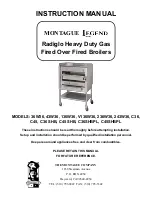
Tft Series Installation and Operation Instructions
│
Trinity
25
5.0 VENT/AIR-INLET TERMINATION CLEARANCES
The quick reference table below is to be read in conjunction with the numbered notes as
indicated, Figures 5-1 and 5-2, and the Venting Rules and Guidelines in Section 4.0. The
instructions detailed in this section are a combination of Trinity Tft specific and National Gas Code restrictions.
Compliance alone doesn’t insure a satisfactory installation as good common sense must also be applied. Failure
to follow these instructions may result in fire, property damage, serious injury or death.
Table 5-1 Termination Clearances Quick Reference Table
(See Figures 5-1 and 5-2)
Clearances to Air-Inlet Termination
Canada
1
USA
2
Min. Distance
Min. Distance
A Above grade/roofline and snow level
8
12 in.
305 mm 12 in. 305 mm
B Above roof line - Concentric Vent
6, 11, 13
24 in.
610 mm 24 in. 610 mm
C To exhaust vent from any other boiler
36 in.
915 mm 12 in. 305 mm
Clearances to Exhaust Vent Termination
Min. Distance
Min. Distance
A Above grade/roofline and snow level
8
12 in.
305 mm 12 in. 305 mm
D Minimum vertical separation above air inlet
9
18 in.
457 mm 18 in. 457 mm
E Minimum horizontal separation from air inlet
3
4 in.
102 mm 4 in.
102 mm
F Window or door that may be opened, or other building opening
36 in.
915 mm 12 in. 305 mm
G To combustion air inlet of any other appliance
36 in.
915 mm 12 in. 305 mm
H Non-mechanical air supply inlet to building
36 in.
915 mm 12 in. 305 mm
I Mechanical air supply inlet to building
4
6 ft.
1.83 m
3 ft.
915 mm
J Soffit, overhang, eave or parapet
24 in.
610 mm 24 in. 610 mm
K Soffit vent or vent opening in an overhang, eave or parapet
6 ft.
1.83 m
6 ft.
1.83 m
L Outside corner
10
-
-
-
-
M Inside corner of an L-shaped structure (including walls and fences)
36 in.
915 mm 36 in. 915 mm
N Service regulator / vent outlet
36 in.
915 mm 36 in. 915 mm
P Each side of center line above or below meter / regulator assembly
5
36 in.
915 mm 36 in. 915 mm
Q Above a paved sidewalk, driveway, or parking lot on public property if adjacent
12
7 ft.
2.13 m
7 ft.
2.13 m
R Above a public walkway
X
X
X
X
S
Above a sidewalk or paved driveway that is located between two single family
dwellings and services both dwellings
X
X
X
X
T Under a concrete veranda, porch, deck, or balcony
7
24 in.
610 mm 24 in. 610 mm
U Above, under or near exterior stairs
X
X
X
X
V Into a canopy or carport
X
X
X
X
Notes:
1 - Canadian installations must comply with the current CSA B149.1 Natural Gas and Propane Installation Code and local
building codes.
2 - US installations must comply with current ANSI Z223.1/ NFPA 54 National Fuel Gas Code and local building codes.
3 - Horizontal separation center-to-center (c.c.) 4”-12” (102-305 mm).
4 - For US installations, an exhaust vent must be 3 ft above a mechanical air supply inlet if within 10 ft. [3 m] horizontally.
5 -
Horizontal clearance must be observed up to a height of 15 ft. [4.6 m] above/below the meter, regulator, or relief devices
.
6 - Concentric Vent must protrude from the roof precisely 24” [610 mm] measuring from the terminal end-cap vanes.
7 - Permitted if veranda, porch, deck, or balcony is made of concrete and a minimum of two sides are fully open beneath.
8 - 24” is the recommended snow level allowance above grade/roofline or any surface that will support snow, debris, or ice
(i.e. for roof venting clearances - roofline and snow level). If living in a snowfall region, consult your local weather
office for the maximum typical snowfall for your area.
9 - Note that the vent must maintain a minimum vertical distance above the air-inlet. Example: Vent height = 18” (457
mm) above air inlet + 12” (305 mm) for air inlet above grade/roof line and snow level = 30” (762 mm) above grade and
snow level.
10
-
Clearances to an outside corner to be in accordance with local installation codes.
11
-
In Canada, concentric vent materials are subject to approval by local inspectors. See Termination Kits in Section 4.0.
12
-
Above public walkways, driveways or parking lots if adjacent to it and condensate cannot drip, freeze, or create a hazard.
13
-
Contact the manufacturer for special exemptions relating to multiple boiler installations using concentric vents.
_
X
-
Not permitted by National gas code(s) and/or recommended by boiler manufacturer.
















































